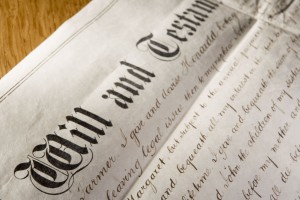Wills
 A will is a legal document which names the people and or organisations you elect to receive your assets upon your death
A will is a legal document which names the people and or organisations you elect to receive your assets upon your death
What Is A Will?
A will is a written document in which you state how you want your property distributed after you die. A person who makes a will is called a “testator”. Making a will allows you to choose what happens to your assets after you die. It also allows you to nominate an executor, who is the person responsible for making sure your wishes are met.
What Happens If I Die Without A Will?
If you die without having made a will, you are said to have died intestate. If this happens, your next of kin will have to apply to the Supreme Court for Letters of Administration, which will allow them to distribute your estate in a certain way. If you are the next of kin of someone who has died intestate, you should seek legal advice. Contact RJ Thomas.
Who Can Make A Will?
You can make a will if you are over 18 years of age and are of sound mind. You must know that you are making a will, understand the nature and effect of the proposed will and that you are distributing your property according to your own intentions.
If you wish to make a will and you are under 18 years and have never been married, you can apply to the Supreme Court. If you are under 18 years and married, you can make a will. Also, if you are under 18 years and are about to be married, you can make a will in contemplation of that marriage. Your will becomes valid when that marriage takes place.
Formal Requirements For Making A Will
The key requirements for a valid will are:
- the will must be in writing
- the will must be signed by the testator at the end of the will;
- the testator’s signature must be witnessed by two witnesses.(A beneficiary or their spouse cannot witness a will. If they do they will lose their entitlements under that will);
- the witnesses must sign the will in the presence of the testator and each other.
As the formal requirements for making a valid will must be strictly adhered to, it is recommend that you have your will drawn up professionally by a solicitor or Trustee company.
What Should Be In A Will?
The will should specify that it is your last will and that you revoke any previous wills. It should appoint one or more persons to be your executor/s. Wills often include other requests such as funeral arrangements, preferences for disposal of the testator’s body and the appointment of a guardian to look after the testator’s children. As wills are only meant to deal with property, wishes such as these are not strictly binding on the executor, but can demonstrate the testator’s intention. If a court is asked to determine the residency and guardianship of any children, the testator’s wishes will be taken into account.
Your will should provide for payment of funeral expenses and any debts. It should then state how you want your property distributed, either by naming the item and to whom it is given, or by giving a person a certain amount or percentage of the total value of your property. If your will contains specific gifts, it should also state what is to happen with the residue (remaining assets) of the estate.
Executors
An executor is a person named in your will to look after your estate. An executor must be over 18 years of age. It is easier, although not compulsory, if the executor lives in the same state as the testator. It is also preferable to name two executors in a will. This will be of assistance if one executor dies or no longer wishes to act as executor. When considering people to be your executors, it is preferable to choose someone close to you, trustworthy and of a similar age. These are simple safeguards against possible complications later. If no executor is named in your will, the Supreme Court will appoint an administrator.
Changing Or Updating A Will
Once a will has been signed, there can be no alteration, either by crossing out or writing in new clauses. Alterations such as these will have no effect. The best way to amend or alter a will is by doing so in a separate document called a “codicil”. For a codicil to be valid it must also meet the formal requirements of making a will. In many ways it may be easier to make an entirely new will.
How Marriage Or Divorce Affects Your Will
Your will is automatically revoked, or made invalid, when you get married and on the day you are formally divorced by a court. However, wills made in contemplation of marriage or divorce are valid. If you do not wish to make a will in this way, a new will must be made after you marry or divorce, otherwise you will die intestate.
Contesting A Will
A person may challenge your will on a variety of grounds including that you were not of sound mind, or were unduly influenced or pressured by another person when making your will. Wills can also be challenged if they do not meet the formal requirements for making a valid will. Another reason for challenging your will is on the ground that you failed to make adequate provision for the proper maintenance and support of a dependant. If one of your dependants expected to be a beneficiary under your will and has been left out, they may be able to make a claim. If you have been left out of a family member’s will and believe you should have received a share of their estate, you should seek legal advice.
Contact RJ Thomas
Powers of Attorney
A Power of Attorney is a legal document that allows you to appoint another person (known as an attorney) to manage your affairs and make legally binding decisions on your behalf.
There are two types of Powers of Attorney:
1. General Power of Attorney;
2. Enduring Power of Attorney (EPA).
Some frequently asked questions about Powers of Attorney are answered below.
Q. What is the difference between a General Power of Attorney and an Enduring Power of Attorney?
A. A General Power of Attorney is only valid while you are mentally competent. Examples of when you would use this form of Power of Attorney are if you were going away on holiday or being admitted to hospital for an extended period. An EPA appoints an attorney for the long-term and remains valid even if you should become mentally incapacitated.You may also consider the appointment of an enduring guardian who you authorise to make health and lifestyle decisions for you when you are no longer capable.
In both forms of Power of Attorney, you can restrict the types of decisions that your attorney can make on your behalf by including conditions or limitations in the document.Both types of Power of Attorney cease to have effect upon your death.
Q. Who should be my attorney?
A. Any person over the age of eighteen can be your attorney. However, RJ Thomas Solicitor recommends that the person you choose to be your attorney is a person whom you trust absolutely.
Q. What is an alternate attorney?
A. An alternate attorney is someone appointed by you to act in place of your attorney should your attorney die or be unable or unwilling to continue.
Q. What powers does my attorney have?
A. Your attorney will control your property and financial affairs.
If you have given your guardian the power to deal with your personal care matters, the guardian may deal with where you live; who you live with; whether, where and how you work; what education or training you receive; whether you apply for a licence or permit; your daily dress and diet; whether to consent to forensic examination of you; whether and where you will go on holiday; and legal matters relating to your personal care.




